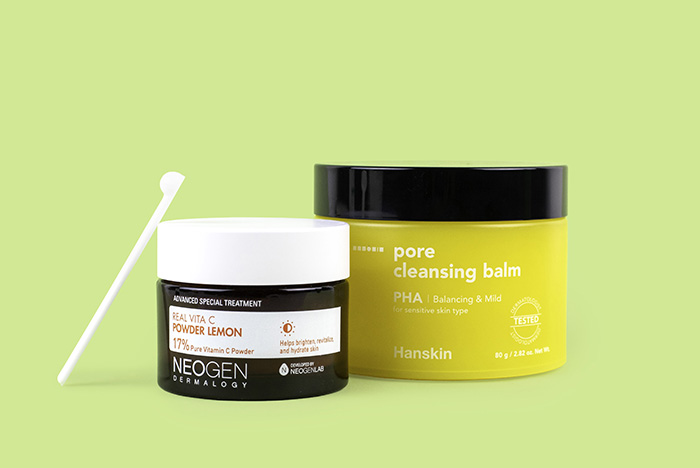Can You Use Vitamin C With Aha
Wondering how to layer acids in your skin care routine? You've come to the right place.
The skin care community can be separated into two different types of people: Those who are obsessed with exfoliating and those who are still skeptical about trying it. Especially when it comes to acids like AHAs, chemical exfoliation can sound intimidating, but once you start, it's easy to go overboard.
When done correctly, exfoliating is such an important part of your routine. It helps to clear pores, prevent acne, and keep your skin even and smooth.
There are two main types of exfoliators: Physical and chemical. Physical (or manual) exfoliants typically feature ingredients like sugar to slough away the dead cells on the skin's surface. Chemical exfoliators are bit more complex which is why we're going to focus on how exactly they work and how to best layer them for effective results. We'll also answer two of your most frequently asked questions: Can you use AHAs and BHAs in one routine? And can you use them with vitamin C?
What are acids/chemical exfoliants?
Putting an acid on your face may not sound like a good or safe idea, but it's not as scary as it sounds – we promise! Here's how it works: Chemical compounds loosen and get rid of the gunk (think: sebum, dead skin cells, etc.,) lurking on your skin.
There are many different types of acids but they are usually separated into two categories: AHAs and BHAs. The former, alpha hydroxy acids, are water-soluble and give you smoother skin, while the latter, beta hydroxy acids, are oil-soluble and get into your pores to clean them. A popular form of AHAs is glycolic acid (found in the A'Pieu Glycolic Acid Cream) and a common form of beta hydroxy acids is salicylic acid.
There's even a new generation of acids called PHAs – polyhydroxy acids – that don't penetrate as deeply as their counterparts and thus are great for more sensitive skin types. If you're interested in giving PHA's a try, the Hanskin Pore Cleansing Balm PHA is a great product to start with.
Can I use AHAs and BHAs together?
You may not want to choose between using AHAs and BHAs, but according to San Francisco-based dermatologist Dr. Caren Campbell, "in theory, it's ok, but the bigger issue is the side effect profile of using both in combination. Using these [together] can cause dry, red, irritated, and flaking skin."
But since everyone's skin is different, the combo could be safe and even beneficial for some, like those with oily skin.
We like to think of layering acids like double cleansing. Just like you use an oil cleanser first because oil attracts oil, you'll want to go in first with that oil-soluble BHA and then follow with AHAs, which are water-soluble. In this regard, they can work in synergy to effectively deep clean your pores.
Conveniently, some products contain both AHAs and BHAs in them already, like the Some By Mi AHA-BHA-PHA 30Day Miracle Serum, so you don't even have to think about how to layer them.
If you do notice any redness, sensitivity, or excessive dryness, back off and try alternating use, i.e. using AHAs one day and BHAs the next.
What if I want to use an AHA/BHA with my vitamin C product?
Vitamin C can have exfoliating effects on the skin, which is why we generally don't recommend mixing vitamin C with your AHAs and BHAs. As with using AHAs and BHAs together, throwing vitamin C into the mix can be a recipe for irritation.
"In my practice using a combo of vitamin C and AHA/BHA is best for oily-skinned patients that want to fade old acne scars or sun spots," says Dr. Campbell. "I advise against it in most patients who are combo or normal as you'll get too dry using these on a daily basis. It would likely serve you to use the vitamin C during the day and the AHA or BHA only a few times per week."
If you find your skin can handle it, though, Dr. Campbell recommends "going from the lightest formula to heaviest – serum, lotion, then cream for example."
Since vitamin C is often found in a serum, you would likely apply it after your products (typically toners and exfoliators) that contain BHA and AHAs.
More do's and don'ts of mixing and layering acids, right this way.
join the conversation
How do you layer acids in your routine? Share your routine below!
comments
LEAVE A COMMENT
Can You Use Vitamin C With Aha
Source: https://theklog.co/how-to-layer-acids-in-your-skin-care-routine/#:~:text=Vitamin%20C%20can%20have%20exfoliating,be%20a%20recipe%20for%20irritation.

0 Komentar